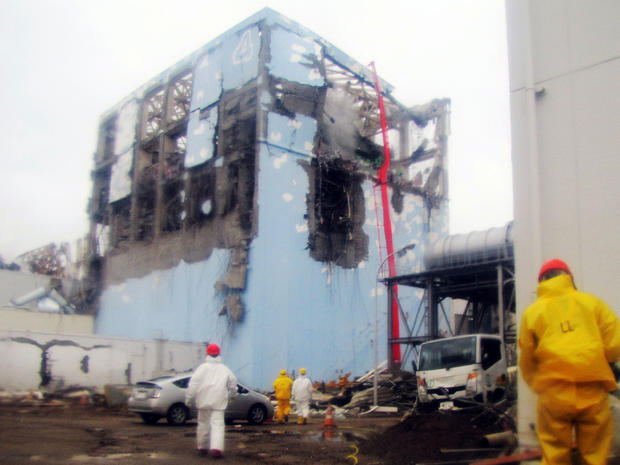Disaster in Japan: Latest developments, March 23
Updated 7:19 p.m. Eastern
- (NHK) - "Steam like smoke" was seen coming from reactor Nos. 1 through 4 of the Fukushima nuclear power plant Thursday morning in Japan, according to Japanese broadcaster NHK. This instance represents the first time steam has been seen rising from reactor No. 1.
- (Deutsche Welle) - The Central Institute for Meteorology and Geodynamics in Vienna says the amount of radiation leaking from the Fukushima nuclear power plant is expected to be comparable to the amount released during the Chernobyl disaster in 1986, German broadcaster Deutsche Welle reported.
- (Los Angeles Times) - In Ishinomaki, Japan, parents are searching through the ruins of Ookawa Elementary School, which has turned into a graveyard for nearly 100 children and teachers who survived the earthquake but were swept away by the tsunami.
Survivors say the children were urged by three remaining instructors to follow a long-practiced drill: Don't panic, just walk single file to the safety zone of the school's outdoor playground, an area free of falling objects.
For nearly 45 minutes, the students stood outside and waited for help. Then, without warning, the monstrous wave swept in, demolishing what was left of the school and carrying most of the students to their deaths. Twenty-four survived.
"Those children did everything that was asked of them, that's what's so tragic," said Haruo Suzuki, a former teacher here. "For years, we drilled earthquake safety. They knew an event like this wasn't child's play. But no one ever expected a killer tsunami."
- (AP) Japan's National Police Agency said Wednesday that the disaster's death toll has topped 9,500. The overall number of bodies collected so far stood at 9,523, while 16,094 have been listed as missing. The number of people left homeless by the earthquake and tsunami is 261,118.
- (AP) Tokyo's utility company says black smoke has been seen emerging from Unit 3 of the crippled nuclear plant in northeastern Japan, prompting a new evacuation of the complex. Officials with Tokyo Electric Power Co. said Wednesday that workers from the entire Fukushima Dai-ichi plant have been temporarily evacuated. Operators of the power station have been desperately trying to cool the reactors and spent fuel pools at the plant after it was damaged by this month's tsunami, which knocked out power to the cooling systems.
- (AP) Tap water in Tokyo tested two times above the limits for radioactive iodine considered safe for infants, officials said Wednesday. Levels of radioactive iodine in tap water at a water treatment center in downtown Tokyo that supplies much of the city's tap water contained 210 becquerels per liter of iodine-131, officials from the Tokyo Water Bureau said. The recommended limit for infants is 100 becquerels per liter.
-
(AP) Japan's government says the economic costs of the catastrophic March 11 earthquake and tsunami could reach $309 billion. The damage to housing, infrastructure and businesses in northeast Japan could cost between 16 trillion yen and 25 trillion yen ($309 billion), according to the Cabinet Office.
- Updates from Tuesday, March 22:
- Almost two weeks after disaster struck Japan, thousands of displaced survivors are still struggling to find adequate food, water and shelter in the face of disease and radiation scares. Lucy Craft reports from Tokyo:
- (AP) The U.S. Food and Drug Administration said it would halt imports of dairy products and produce from the area of Japan where a nuclear reactor is leaking radiation. The FDA said Tuesday that those foods would be detained at entry and would not be sold to the public. The agency previously said it would just step up screening of those foods.
- (Japan Times) In a rare move, identified bodies were buried in quake-stricken areas in the absence of fuel at many crematoriums. The number of deaths in 12 prefectures came to 9,080 as of 6 p.m. and that of people reported missing by relatives climbed to 13,561 in six prefectures.
Complete coverage: Disaster in Japan
Radiation levels spike in Tokyo tap water
Japan nuke plant evacuated as smoke rises

